What are the early symptoms of prostate cyst? How to prevent it?
Everyone is familiar with prostate cysts. Nowadays, with the accelerated pace of life and careless diet, many male friends will suffer from prostate cysts and suffer from this disease, which seriously affects their life and work.
Early symptoms of prostate cysts:
1. Frequent urination and urgency. Due to the occurrence of diseases, urethral obstruction in men often occurs, which affects men's normal urination and often causes urgency and frequency of urination.
2. Intermittent urination. Some patients need to hold their breath when urinating. The reduction in abdominal pressure during exhalation can easily lead to interruption of urination, requiring further force to continue urination.
3. There are blood streaks in the urine. Suffering from this disease, the male prostate will be congested for a long time, and there will be some blood streaks in the urine.
4. Increased sexual desire. Patients often experience hypersexuality that is inconsistent with their own. Since the prostate is in a congested state, it can easily cause prostate function disorders, leading to increased male sexual desire.
5. Decreased kidney function. If the patient delays the disease to an advanced stage, the decline in kidney function caused by long-term urethral obstruction will manifest as symptoms of loss of appetite, vomiting, and even anemia.
How to treat it?
Small and asymptomatic cysts do not need treatment. Larger cysts or symptomatic small cysts can be treated surgically. There are many ways: transvesical, extravesical, transperineal, transrectal, etc., often due to poor exposure. It results in incomplete surgical resection, high recurrence rate, and many complications. Surgical resection of cysts near the perineum through the perineal approach can easily cause ED, so it should be used with caution in young patients.
When the abscess cavity is large and there is a lot of pus, it is better to incise and drain the abscess cavity. Use an anorectoscope to expose the prostate, use a sharp knife to cut the rectal wall into the abscess cavity, drain the pus and place a drainage tube. The time to remove the drainage tube will be decided based on the drainage situation and combined with the examination. Currently, this treatment still requires antibiotics.
Physiotherapy is helpful for acute prostatitis and abscess. According to the conditions and needs of each hospital's equipment, rational application can promote the absorption of inflammation. If there is no physical therapy conditions, apply a hot water bottle on the pubic bone or perineum for about half an hour each time, and the effect will be good if you insist on it for several days.
What methods can prevent prostate cysts?
1. Do not eat spicy and irritating foods: avoid causing congestion of sexual organs, reducing symptoms of hemorrhoids and constipation, compressing the prostate, and aggravating difficulty in urination. Arrange three meals a day to achieve a balanced diet.
2. Overwork and overwork will deplete the middle Qi. Insufficient middle Qi will make the patient unable to urinate and easily lead to urinary retention.
3. Sitting for a long time: Sitting for a long time can cause hemorrhoids and other diseases, make the perineum congested, and make urination difficult. Participating in more sports or Qigong exercises can help reduce symptoms.
4. Treat prostatitis, cystitis and urethrolithiasis promptly and thoroughly.
5. Drink more water: Drinking too little water can cause dehydration, which is not conducive to flushing the urinary tract. It can also easily lead to concentrated urine and the formation of insoluble stones. Therefore, in addition to appropriately reducing drinking water at night to avoid overfilling of the bladder after sleeping, you should drink more water during the day. Drink at least 7 glasses of water (about 2000 ml) every day. Drink a glass of water (70 ml) every morning after getting up. For example, drinking "One Line Waterfall" tea is more suitable for middle-aged and elderly people with difficulty urinating.



















